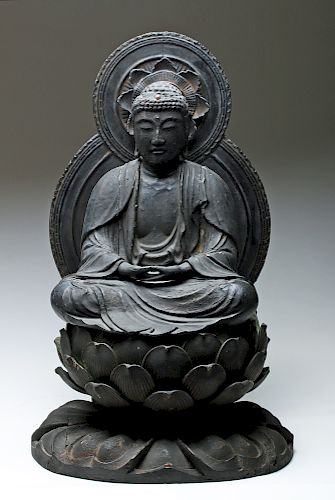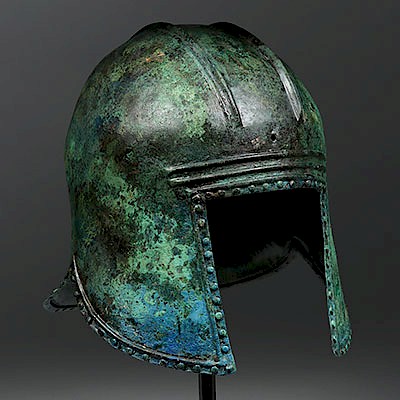19th C. Japanese Wood Amida Buddha
Lot 108
About Seller
Artemis Gallery
686 S Taylor Ave, Ste 106
Louisville, CO 80027
United States
Selling antiquities, ancient and ethnographic art online since 1993, Artemis Gallery specializes in Classical Antiquities (Egyptian, Greek, Roman, Near Eastern), Asian, Pre-Columbian, African / Tribal / Oceanographic art. Our extensive inventory includes pottery, stone, metal, wood, glass and textil...Read more
Estimate:
$4,000 - $6,000
Absentee vs Live bid
Two ways to bid:
- Leave a max absentee bid and the platform will bid on your behalf up to your maximum bid during the live auction.
- Bid live during the auction and your bids will be submitted real-time to the auctioneer.
Bid Increments
| Price | Bid Increment |
|---|---|
| $0 | $25 |
| $300 | $50 |
| $1,000 | $100 |
| $2,000 | $250 |
| $5,000 | $500 |
| $10,000 | $1,000 |
| $20,000 | $2,500 |
| $50,000 | $5,000 |
| $100,000 | $10,000 |
| $200,000 | $20,000 |
About Auction
By Artemis Gallery
May 10, 2018
Set Reminder
2018-05-10 10:00:00
2018-05-10 10:00:00
America/New_York
Bidsquare
Bidsquare : Fine Ethnographic / Asian / Ancient Art
https://www.bidsquare.com/auctions/artemis-gallery/fine-ethnographic-asian-ancient-art-3213
Featuring antiquities from around the world including Pre-Columbian, Tribal, Classical, Asian, so much more! Artemis Gallery info@artemisgallery.com
Featuring antiquities from around the world including Pre-Columbian, Tribal, Classical, Asian, so much more! Artemis Gallery info@artemisgallery.com
- Lot Description
Japan, late Edo Period, ca. 19th century CE. This is a wooden sculpture of the Amida Buddha seated with his hands in the Dhyana mudra, the gesture of meditation, also called the full lotus position. He is covered in black lacquer over a gesso base coat. He has a red jewel embedded beneath his ushnisha (the bump on top of his head that symbolizes a part of his enlightenment) and inset crystal eyes. He was made out of several blocks of wood put together. Size: 8" L x 10" W x 19" H (20.3 cm x 25.4 cm x 48.3 cm)
The Buddha figure is seated on a ca. 19th century CE wooden throne in the form of a lotus flower with a mandorla behind his head; it seems likely based on the lacquerwork that this throne was originally made for another figure, but the size suits him well. The Buddha itself comes from the Edo Period in Japan, when the country was closed to almost all foreigners and enjoyed political stability for 250 years, allowing artwork to flourish. A piece like this would have been produced by a master craftsman in a workshop and sold to the general public or put into a shrine or temple. The level of carved detail on both Buddha and base is impressive.
Provenance: private Loveland, Colorado, USA collection; previously Honeychurch Antiques, Seattle, USA
All items legal to buy/sell under U.S. Statute covering cultural patrimony Code 2600, CHAPTER 14, and are guaranteed to be as described or your money back.
A Certificate of Authenticity will accompany all winning bids.
We ship worldwide and handle all shipping in-house for your convenience.
#110433Although there is some wear, especially to the Buddha figure, the piece is intact. Gold shines through on the mandala.Condition
- Shipping Info
-
All shipping is handled in-house for your convenience. Your invoice from Artemis Gallery will include shipping calculation instructions. If in doubt, please inquire BEFORE bidding for estimated shipping costs for individual items.
-
- Buyer's Premium



 EUR
EUR CAD
CAD AUD
AUD GBP
GBP MXN
MXN HKD
HKD CNY
CNY MYR
MYR SEK
SEK SGD
SGD CHF
CHF THB
THB















